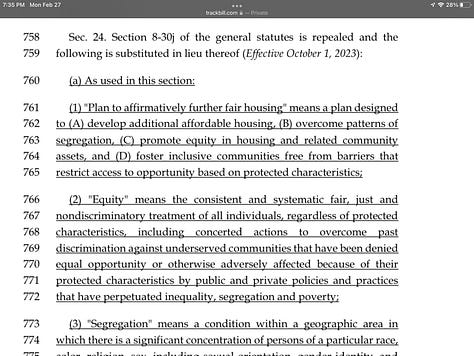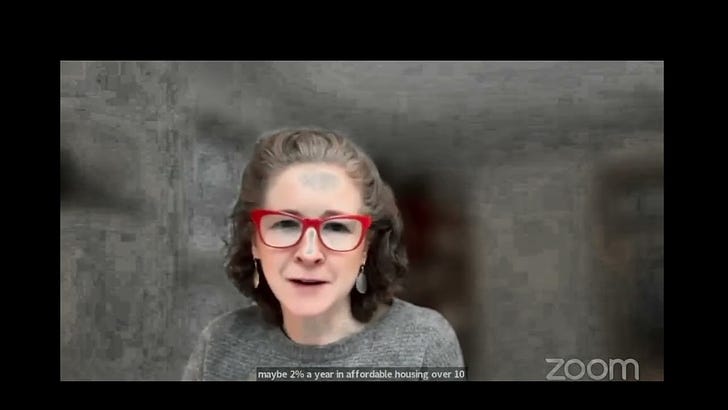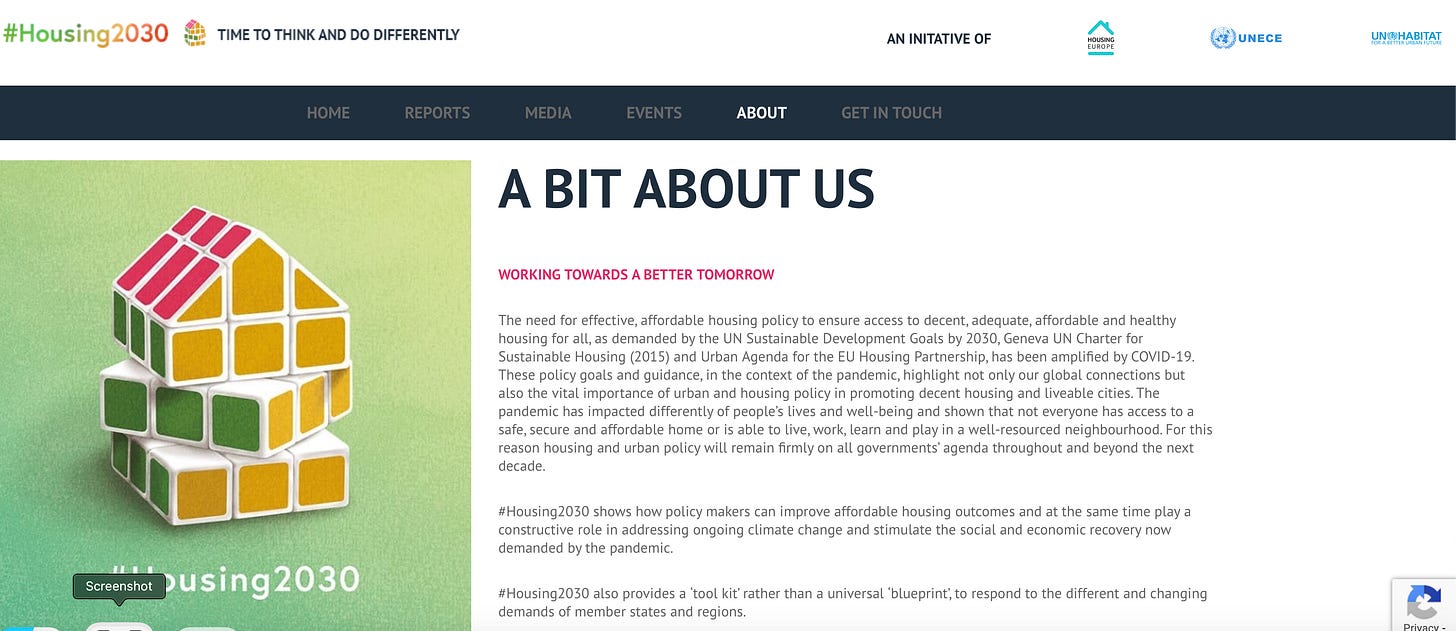"Sustainable Development"
The politics and policy of affordable housing and centralized government.
With a super majority holding the power in Connecticut, lawmaking has become a cake walk for party leadership and their pet projects. It is no secret that Hartford is coming for small towns in Connecticut to reshape zoning to be equitable and fair. What does that mean? Who determines what is fair or equitable? The citizens ultimately pay for the cake, so these are very fair questions. There are winners and losers in the game of policy making. A cluster of bills will directly affect small towns and single family residents if passed into law. Property taxes will soar. Municipalities will be at the mercy of the State and its bureaucracy. A bureaucracy which is built on an ideology that lacks an understanding of fiscal reality, and for the diversity of life in towns across Connecticut. Fortunately there is bipartisan opposition to this cluster of bills, but it will take a major push from the public to stop them. We are about to trade affordable living already being lived, actually struggling in this inflation, and trade that affordability according to the government’s standards. This is unsustainable and will create hardship in our small towns and communities across the State of Connecticut in the name of “fair share”, inclusivity, and equity.
This video clip is from the hearing last Tuesday testifying on
AN ACT CONCERNING A NEEDS ASSESSMENT AND FAIR SHARE PLANS FOR MUNICIPALITIES TO INCREASE AFFORDABLE HOUSING.
To (1) require an assessment of the state-wide need for affordable housing and an allocation of such need to planning regions and municipalities, (2) require the creation of fair share plans for each municipality, and (3) establish penalties for municipalities that fail to submit fair share plans.
Erin Boggs, Esq., Executive Director of The Open Communities Alliance
According to Ms Boggs, this is equitable, sustanable, and fair. She is advocating for a new public, private, partnership, to be in our government that will over see the 169 towns and cities across the state where there will be a task force and a new bureaucrat to make sure the towns are equitable and fair. From the color of the population, to gender and sex orientation. The “protected class” must be protected, but from what and who? We do not need a protected class, all people have equal protection under the law whatever their race, creed, color, or religion, sexual orientation, or gender. This is a basic fact, and already law. An ideologue could make an argument all day long, but equal protection is the law. We do not need a task force, nor more privilege for developers, and suburban sprawl, and more think tanks. We especially do not need centralized control of our local municipalities. We have empty buildings, empty houses in need of repair and occupants. We need industry, occupants, and people of all races and creed to fill what we already have.
Ms Boggs points to New Jersey as a shinning example of how great fair share is. In her testimony she left out a lot of important details. The number one being that it is unaffordable for home owners already living in affordable housing to finance all of this. It is not white privilege to own a home, it is not black, or brown privilege to own a home, it is hard work to own a home. The Civil Rights Movement changed things in this country. We need to honor that happened and use the laws we already have against discrimination and fair housing. Nowhere in NJ were there funds allocated to pay for affordable housing. The courts had to get involved, and that made an even bigger mess in New Jersey. Locals called it judicial activism. The court’s ruling lead to the Mount Laurel Doctrine that later became, The Council on Affordable Housing/ COHA. From there a three panel judiciary was appointed to oversee affordable housing cases brought against towns failing to meet their affordable housing quotas. NJ is not a shinning example of a working program. Developers were given privileges that became know as “builder’s remedy” where towns would be sued by big developers and forced into developing giant housing units the town did not want, nor could sustain. There is an on going battle in NJ and it is far from a success.
How is this sustainable and equitable? Who is it sustainable for for? Take for example the 56 page bill, HB 6781. How will towns pay for this? Who decides what diversity means and looks like? How is fairness determined? What about the people who will be taxed out of their affordable homes to pay for quotas? In the Connecticut bill there is no allocation of funds to pay for this. Grants will be used as carrots as they always are, but the funding for the infrastructure, schooling, and services, will drive the cost of living up and create a whole new issue, higher mill rates and un-affordability for already housed families.






The elephant in the room is, who is driving the policy behind the people elected to serve in office in our local government? The answer may surprise some, and others have already read the tea leafs and know. It’s The United Nation’s 17 Sustainable Development Goals. The restructuring of towns and cities is the United Nation’s Goal Number 11. An unelected body is driving this policy in Connecticut from an entity abroad. This is not a conspiracy theory, it is an actual real live conspiracy to consolidate world government under the WHO and United Nations. The language is the same across the globe, sustainability, equity, inclusion, and climate change. Net Zero, Vision Zero, Fair Share, Build Back Better, this is sustainable development. You need to know and understand what it is, find it in your town and stamp it out! Sustainable Development is EVERYWHERE. Here is the conspiracy for you to read. Draw your own conclusions. In the mean time, please contact your legislators and tell them to leave our towns alone!
Connecticut House Republicans
(860) 240-8700
Connecticut House Democrats
(860) 240-8500
Connecticut Republican Senate
(860) 240-8800
Connecticut Democrat Senate
(860) 240-8600
Follow this local group for updates!
CT 169 Strong
https://ct169strong.org
Links and Resources
Fair Share Housing
Housing Committee Public Hearing Agenda
https://www.cga.ct.gov/2023/HSGdata/pha/pdf/2023pha00228-R001100HSG-pha.pdf
Open Community Alliance Connecticut
Before Zambia, Kari resided in Michigan, where she created extensive partnerships, which included a vibrant campaign for second parent adoption and a successful campaign to keep a majority POC school from closing. Kari has worked with large donors, generated funds for national efforts, and won grants for multiple projects in Michigan, Zambia, and Connecticut. Kari has written articles in numerous publications and was a contributing author for Trans-Kin: A Guide for Family and Friends of Transgender People, which won the 2013 International Book Award for Gay and Lesbian Non-Fiction.
https://www.ctoca.org/kari_nicewander
Ms. Boggs has extensive fundraising experience, successfully obtaining funding from national and local foundations as well as state and federal funding sources. She served as a member of a group convened by the Ford Foundation to explore innovative approaches to sustainable development and housing integration. Ms. Boggs has also participated as a fair housing advisor in two Sustainable Community Initiative grants in the Connecticut region. These interagency collaborative federal grants are an effort to bring together considerations of sustainable and equitable growth to foster better regional planning.
Ms. Boggs has been involved in the production of a range of publications including those addressing zoning, opportunity, equity, and affirmatively furthering fair housing. She made substantial contributions to the 2015 Connecticut Analysis of Impediments to Fair Housing Choice. Ms. Boggs is a graduate of Wesleyan University and Georgetown University School of Law. A native of Washington, D.C., Ms. Boggs attended the D.C. Public Schools.
https://www.ctoca.org/erin_boggs
Peter Haberlandt, Senior Legal Counsel, phaberlandt@ctoca.org, 860-610-6040 x3513
Peter Haberlandt is OCA’s Senior Legal Counsel. Pete joined OCA in January 2019 after over seven years of service in State Government in Connecticut. Prior to joining OCA, Pete served as the Director of the Division of Legal and Governmental Affairs for the State Department of Education, where he was tasked with a broad legal and policy portfolio, including serving as general counsel for the Department and the State Board of Education. Before that, he served for several years as an Assistant Attorney General and worked in private law practice with the firm Cowdery, Ecker, and Murphy. Pete served as a law clerk to the Hon. Jon O. Newman of the U.S. Court of Appeals for the Second Circuit and the Hon. Eric L. Clay of the U.S. Court of Appeals for the Sixth Circuit. He graduated with High Honors from the University of Connecticut School of Law in 2004, where he was Editor in Chief of the Connecticut Law Review. Pete received his undergraduate degree from Cornell University in 1999.
https://www.ctoca.org/peter_haberlandt
Connecticut Zoning
NJ
NJ
https://www.njfuture.org/2015/03/10/coah-decision/
Fair Share
https://www.fairsharehousing.org
United Nations
https://sdgs.un.org/goals/goal11
https://www.housing2030.org
Mount Laurel
https://en.wikipedia.org/wiki/Mount_Laurel_doctrine
Affordable Housing
https://studentwork.prattsi.org/infovis/visualization/visualizing-nj-affordable-housing/








thank you for bringing this to daylight!
Thank you for this. We really are in danger and being attacked on all fronts. I emailed my Representitives. I also joined the group. Thanks again for putting this together and providing the links.